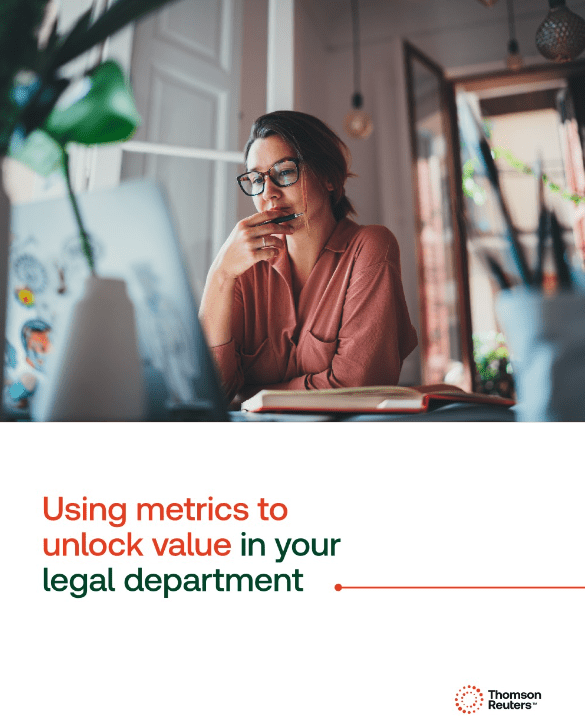Strengthening the legal-financial partnership for strategic success
To be successful in any organization, the legal department must work seamlessly across multiple functions. In particular, sales, HR, IT, audit, and compliance are key collaborators. But one relationship stands above the rest — the indispensable partnership between the Chief Legal Officer (CLO) and the Chief Financial Officer (CFO).
This alliance has become critically important to any business. Why? These two functions are uniquely positioned with a 360-degree view of the business. Together, they assess risks, drive compliance, shape strategy and policy, and guide executive decision-making amid incredibly complex conditions.
Today, more than ever, this partnership is not just about alignment between the functions. It’s about shared leadership in a business environment currently defined by digital disruption, political polarization, global regulatory fragmentation, and hotly divided societal expectations around corporate citizenship and accountability. Smart CLOs are thinking hard about how they can lead and strengthen their partnership with the CFO for long-term impact and success.
Below, we explore why these two functions must be tightly aligned and how CLOs can deepen this collaboration to help protect, enable, and grow the business.
Jump to ↓
Risk management in an unpredictable world
ESG and DEI: Navigating the politics
AI governance: Accelerating risk and opportunity
Institutional knowledge: The overlooked value of the CLO and CFO alliance
Strategies to deepen CLO and CFO collaboration
Risk management in an unpredictable world
The CLO and the CFO are hyper-focused on risk management. Managing risk, however, is no longer function specific. It is enterprise-wide and strategic, and managing risk requires integrated legal-finance leadership. Here are just a few of the major risks facing companies today:
- Cybersecurity and artificial intelligence (AI) threats: Ransomware, privacy breaches, and potential liabilities from using public access AI tools, such as intellectual property violations and algorithmic bias.
- Regulatory fragmentation: Global inconsistencies in Environmental, Social, and Governance (ESG), competition law, AI, privacy regulations, and more.
- Geopolitical and supply chain disruptions: Sanctions, tariffs, export controls, and armed conflicts abound.
- Climate accountability: Expanding environmental disclosures and enforcement/expectations that vary widely by country and by state.
- Domestic political instability: Volatile US enforcement trends, partisan regulatory reversals, state-level legislative divergence, activist attorney generals, consumer boycotts, reputational hazards, and social media attacks.
When acting separately, legal generally assesses liability, compliance, and reputational risk, while finance manages exposure, forecasting, and cash flow. But without alignment and cooperation between the CLO and the CFO, threats are missed or misunderstood. When the two functions collaborate, the company gains on multiple fronts, including better risk mapping, better decision-making under uncertainty, coordinated risk mitigation strategies, and nimble responsive crisis management. Below are a few examples of how the CLO and CFO can partner to deal with this myriad of hot-button issues.

White paper
Unlock the hidden value in your legal department with data-driven insights
Access white paper ↗
ESG and DEI: Navigating the politics
Most companies want to uphold their responsibilities to employees, shareholders, and customers. In this vein, ESG and Diversity, Equity, and Inclusion (DEI) efforts have grown in importance, becoming central to enterprise value and stakeholder trust for many businesses. But that is changing rapidly. Today’s volatile US political climate has dramatically altered the calculus for most companies. There are now significant shifting regulatory and political dynamics that must be monitored and mastered. For example:
- The EU’s Corporate Sustainability Reporting Directive (CSRD) requires granular ESG disclosures.
- US regulators like the Securities and Exchange Commission (SEC) maintain some climate rules, but enforcement is inconsistent under the current administration.
- DEI backlash is intensifying — executive orders and state laws now restrict DEI initiatives for many companies in certain states.
- States diverge dramatically: blue states support ESG and DEI initiatives, while red states impose penalties on companies who base investment decisions on outside factors. Businesses face challenges in navigating these polarized positions.
- Employees and customers either support or oppose such efforts, with extremes becoming the norm. Companies are becoming targets for boycotts and unwanted social media attention, often leading to divided workforces that bring their disagreements into the office.
These challenges force companies to make difficult decisions regarding compliance across jurisdictions, strategic public positioning, and balancing reputational and regulatory risk. This is where the alliance between the CLO and the CFO pays dividends. The CLO focuses on monitoring and interpreting conflicting legal mandates, defending ESG and DEI programs where legally viable, and advising on reputational and disclosure risk. The CFO evaluates the cost–benefit implications of compliance versus withdrawal, analyzes the impact of ESG and DEI positions on investor relations, credit risk, and insurance, and seeks alignment between ESG and DEI initiatives with broader business value and shareholder expectations.
Acting together, they can pool their resources and mandates to design adaptable ESG strategies that survive regulatory and political shifts, maintain defensible DEI frameworks aligned to mission and risk profile of the business, and advise the board with comprehensive legal-financial insights.
AI governance: Accelerating risk and opportunity
Artificial Intelligence introduces innovative capabilities and unprecedented risk for many companies. Generative AI (GenAI) in particular brings new exposure areas to businesses around the globe:
- Existential questions: Should your employees be allowed to use GenAI for work purposes?
- Compliance uncertainty: Regulatory guidance is still in flux.
- Intellectual property: AI-generated content may violate third-party rights.
- Bias and discrimination: Biased AI systems can lead to reputational damage and legal claims.
- Data governance: Sensitive data must be secured and ethically managed.
- Financial unpredictability: AI tools may generate short-term savings but long-term liabilities.
Under the guidance of the CLO, legal must define AI governance, ethics, and compliance policies. Under the CFO, finance must analyze the return on investment, budget allocation, and long-term financial risk of using, or not using, AI. Smart companies are establishing standing AI oversight committees co-chaired by the CLO and CFO.
Institutional knowledge: The overlooked value of the CLO and CFO alliance
As businesses automate and restructure, and as the workforce ages and retires, institutional memory becomes increasingly scarce yet remains critical of enterprise success. Legal and finance departments tend to have lower turnover, long-term understanding of past deals, disputes, and other critical company decisions. They possess a deep awareness of unwritten rules and internal dynamics of the company.
This deep institutional knowledge helps the company avoid repeating costly mistakes, accelerates decision-making processes, and facilitates the onboarding of new leaders and board members. Given the value of this knowledge, the CLO and CFO should collaborate to create management tools that capture and preserve this knowledge, ensuring it is readily accessible to the appropriate personnel when needed.
Strategies to deepen CLO and CFO collaboration
It’s easy to talk about an alliance in a vacuum, but how do you go about putting it in place? Here are a few ideas to get the ball moving. On the legal department side:
- Embed finance into legal operations: Bring finance into budgeting, vendor reviews, and matter prioritization. When they understand your strategy, they can better advocate for your resources.
- Build fluency and responsiveness: Learn key finance metrics, deliver reports on time, and avoid surprises. Shared fluency eliminates friction and fosters strategic alignment.
- Make connections: Relationships matter. Invite finance leaders to offsites, team events, or community service projects. When trust is personal, collaboration becomes second nature.
Moving partnerships forward often comes down to being willing to make the first move. Here are some questions that can set you down the right path:
- How can legal help finance manage risk more proactively? — Shows commitment to shared leadership.
- What’s your biggest financial concern this quarter? — Opens doors for forward-looking legal support.
- Can we jointly review vendor contracts for cost savings and risk exposure? — Builds accountability and efficiency.
- How are you thinking about AI investments, and what concerns do you have? —Establishes common ground around one of today’s most disruptive technologies.
- Would you like to join our next legal strategy session or offsite? — Encourages integration and mutual respect.
Businesses that succeed in turbulent times are not those where legal and finance cooperate out of necessity. They are the ones where the CLO and CFO are willing strategic co-leaders — nimble, aligned, and empowered to act quickly in an unpredictable world. This partnership is a force multiplier, enabling better risk management, smarter investments, stronger governance, and more resilient organizations.
If you use Thomson Reuters tools, you have the foundation of cooperation in hand, including getting the data needed to make critical decisions. Subscribe to Practical Law to access a wealth of resources that enables you and your finance team to quickly address the issues outlined above and begin developing effective strategies and policies.











